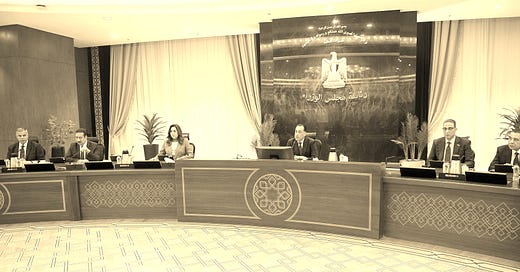Housing Policy Tracker 8 | May 2025
Informal housing monitoring boosted, gov and private real estate sales surge, new IPOs, in-depth coverage of Old Rent Decontrol and other updates
Your monthly summary covering housing, land and urban policy developments, with a focus on Egypt.
Welcome to Housing Policy Tracker 8! In this issue, you'll read about:
Informal Housing Monitoring Boosted Ahead of Elections, PM: Never Reconciling Again
Government for-profit Housing Sales Stats Reviewed but Not Revealed
While Private Sector Sales Stats Revealed
New Real Estate IPOs on the Horizon
Large Scale Real Esate Debt
Amended Drinking Water and Sanitation Law Expands Privatization and Punishes False News
In-depth: Old Rent Decontrol Law Criticized in Public Debates
Note: In case some links fail, please try them on the WayBack Machine, or if not available, Archive Today.
Informal Housing Monitoring Boosted Ahead of Elections, PM: Never Reconciling Again
During the monthly Governors’ Council meeting convened by the Prime Minister, Mostafa Madbouly stated that after the current round of reconciliation of informal buildings ends, “no informal state would ever be reconciled”, where it will be immediately demolished. The PM called on the governors and their heads of security that “full vigilance is required at this stage to confront any encroachments or violation” ahead of senate and parliamentary elections later in the year. The PM was especially concerned with the illegal urbanization of agricultural land, that “is the most valuable asset we possess, and every inch of it is difficult to recover.” This is one of the rare times a high-level government official has publicly tied spikes in informal construction with election season, implying that it is a time that can be exploited by builders whether because of police efforts being redirected at managing the polls, or, where MP hopefuls could promise reconciliation in exchange for votes. The current reconciliation law was passed in 2023 and has given informal builders until November this year to apply to legalize their homes in exchange for a fee. It amended an earlier law passed in 2019 that saw low reconciliation numbers, and follows a long standing tradition of legalizing informal homes that goes back to 1956.
In response, Minister of Local Development, Manal Awad presented how the military’s Spatial Variable ٍSystem (manzumat al-mutaghayirat al-makaniya) was coordinating directly with local councils, and the council’s response rate to the alerts of illegal construction activity on agricultural land or adverse possession of state land from the system, ranking each governorate by how well it performed. MoLD Awad also presented statistics of the 26th Demolitions Wave, though no figures were published.
See the BEO’s Reconciliation Law Series
Keep reading with a 7-day free trial
Subscribe to BEO Housing Policy Tracker to keep reading this post and get 7 days of free access to the full post archives.




